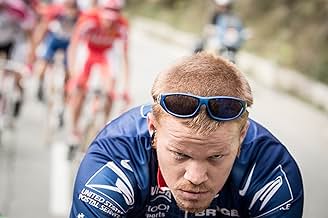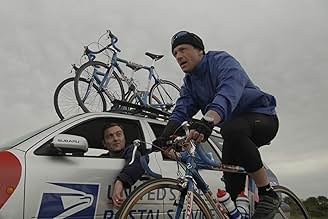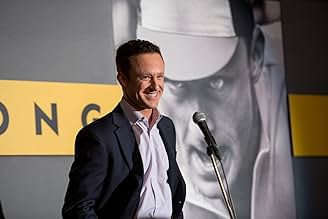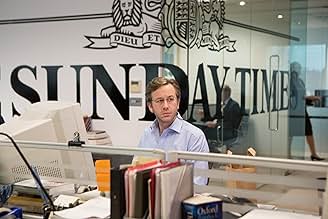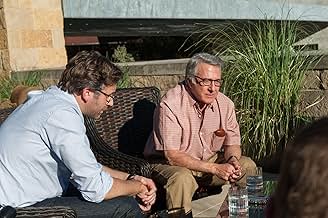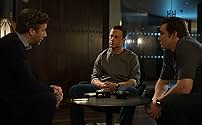Un giornalista sportivo irlandese si convince che le vittorie di Lance Armstrong durante il Tour de France provengono da sostanze vietate. Con questa convinzione, inizia a cercare prove che ... Leggi tuttoUn giornalista sportivo irlandese si convince che le vittorie di Lance Armstrong durante il Tour de France provengono da sostanze vietate. Con questa convinzione, inizia a cercare prove che esporranno Armstrong.Un giornalista sportivo irlandese si convince che le vittorie di Lance Armstrong durante il Tour de France provengono da sostanze vietate. Con questa convinzione, inizia a cercare prove che esporranno Armstrong.
Recensioni in evidenza
This is the story of Lance Armstrong and is based on the book by journalist David Walsh called "Seven Deadly Sins: My Pursuit of Lance Armstrong". Walsh worked for The Sunday Times and is played by the brilliant Chris O'Dowd in the film. Walsh was one of the few who questioned the phenomenal rise of Armstrong from mediocre hill climber to King of the mountains and unbeatable in The Tour de France.
Now the story is full of lies and deceit and evil doings and as such you would think it was full of Machiavellian twists – but no; it seems a bit flat to be honest. The story is interesting but seems to lack the oomph moments to bring it to anything approaching a dramatic crescendo.
I think half the problem is that we all know the story by now and so there is not that much to reveal and we have already gotten truly over our initial shock and disgust at what was a crime the perpetuated for years and corrupted so many – so called- athletes. Having said all that I really enjoyed it. Ben Foster puts in an excellent performance as the duplicitous Armstrong and was even convincing in the cancer bits and the double dealing lies. So one that rises from being above 'ok' but do not expect to be blown away.
Now the story is full of lies and deceit and evil doings and as such you would think it was full of Machiavellian twists – but no; it seems a bit flat to be honest. The story is interesting but seems to lack the oomph moments to bring it to anything approaching a dramatic crescendo.
I think half the problem is that we all know the story by now and so there is not that much to reveal and we have already gotten truly over our initial shock and disgust at what was a crime the perpetuated for years and corrupted so many – so called- athletes. Having said all that I really enjoyed it. Ben Foster puts in an excellent performance as the duplicitous Armstrong and was even convincing in the cancer bits and the double dealing lies. So one that rises from being above 'ok' but do not expect to be blown away.
It's 1993 and Lance Armstrong (Ben Foster) is in his first Tour in France. Irish sports journalist David Walsh (Chris O'Dowd) is both following and rooting for the competitive new American wonderboy. After initial losses, he and his teammates start using enhancements. The team starts winning but then he's diagnosed with cancer. After his tiring treatments, he gets help from Dr. Michele Ferrari who is experimenting outside the ethical lines. Bill Stapleton (Lee Pace) organizes the deal with US Postal. Walsh starts to suspect that something is amiss. God-fearing Floyd Landis (Jesse Plemons) is hired to help Armstrong and he takes over after Lance. Betsy Andreu recounts a moment with Armstrong and her husband. Armstrong decides to defend against his detractors by attacking them.
Despite the great actors and solid work, this still has a biopic feel in the structure of the movie. It follows the story faithfully. The truthfulness seems to be there. Ben Foster does nice work inhabiting the role although I'm not sure if it dives into his mind enough. It would be helpful to add something from before his Tour and doping life. Walsh's crusade is more compelling. The second half of the movie is more compelling. It is generally missing the drama and the thrills. I'm also not certain if this gets any special insight into Armstrong's character. It's a functional biopic but the material is ready for much more.
Despite the great actors and solid work, this still has a biopic feel in the structure of the movie. It follows the story faithfully. The truthfulness seems to be there. Ben Foster does nice work inhabiting the role although I'm not sure if it dives into his mind enough. It would be helpful to add something from before his Tour and doping life. Walsh's crusade is more compelling. The second half of the movie is more compelling. It is generally missing the drama and the thrills. I'm also not certain if this gets any special insight into Armstrong's character. It's a functional biopic but the material is ready for much more.
This is a pretty interesting biopic, with strong performances across the board and a pretty engaging story. However, it's nothing particularly outstanding, due to its evident holding back against really going after Armstrong. Yes, this is still a pretty scathing story, but it still all feels far too plain and simple, and there's never any real gusto in the writing to make you passionately dislike Armstrong, which the movie is trying to do.
But before we get into that, let's look at the most impressive part of this film, which are the performances. Ben Foster, as Lance Armstrong, is brilliant, and often terrifying and hateful to the extent that you really want the movie to show you, and without him doing such a good job in the role, this film would have been at a loss, given his incredible acting.
In the side role as the journalist determined to take Armstrong down, Chris O'Dowd is also pretty good. It's not a world-beating performance that makes you want to whole-heartedly will the man onto revealing Armstrong's lies, but he is a likable character, and one of the only ones that can firmly support in the whole film.
The way that this film tells the history of Armstrong's deception is also very interesting. Although it's all in recent memory for most of us, there's still a lot of information here that you didn't know about, particularly revolving around the inner workings of Armstrong's United States Postal Service team and how he was the ring leader in the world of doping in cycling.
However, that's about it. This film is definitely interesting and well-acted, but it's not an outstanding, memorable biopic. It feels more like reading a very interesting textbook cover-to-cover, full of fascinating information, but with no real high drama or emotion to fully show the significance of what's going on, and to really pull you into the story rather than just observing it.
But before we get into that, let's look at the most impressive part of this film, which are the performances. Ben Foster, as Lance Armstrong, is brilliant, and often terrifying and hateful to the extent that you really want the movie to show you, and without him doing such a good job in the role, this film would have been at a loss, given his incredible acting.
In the side role as the journalist determined to take Armstrong down, Chris O'Dowd is also pretty good. It's not a world-beating performance that makes you want to whole-heartedly will the man onto revealing Armstrong's lies, but he is a likable character, and one of the only ones that can firmly support in the whole film.
The way that this film tells the history of Armstrong's deception is also very interesting. Although it's all in recent memory for most of us, there's still a lot of information here that you didn't know about, particularly revolving around the inner workings of Armstrong's United States Postal Service team and how he was the ring leader in the world of doping in cycling.
However, that's about it. This film is definitely interesting and well-acted, but it's not an outstanding, memorable biopic. It feels more like reading a very interesting textbook cover-to-cover, full of fascinating information, but with no real high drama or emotion to fully show the significance of what's going on, and to really pull you into the story rather than just observing it.
On paper, the life of Lance Armstrong lends itself to a cinematic interpretation quite nicely, but The Program, Stephen Frears' restless, showy Armstrong biopic, feels undercooked and premature. Though Ben Foster's Armstrong jokes about Hollywood's plan for a movie about his life (complete with smirky mispronunciations of Jake Gyllenhaal), his against-the-odds underdog tale was never going to be the more compelling film compared to the true story. It's a small mystery as to why Frears decides to play the first half hour of The Program in such a headspace, urging us to cheer for an idealized version of the famed cyclist despite the inevitable mess that awaits us just around the corner. Such an unnecessary sprawl as we turn through a run-of-the-mill rise-through-the-ranks before the downfall is unkind to detail; instead, it feels like a compromise to make the whole thing go down easier for those unaware of the controversy, and thus the film is probably not quite as invested in the scandals in the first place.
Though The Program is clumsy in its execution and handling of loaded material, it nails its depiction of key moral dilemmas surrounding not just Armstrong's doping scandal that eventually stripped him of his professional accolades–including his seven Tour de France titles– but also effectively ended his athletic career with a worldwide ban from most competitive sports. If Chris O'Dowd's journalist, David Walsh, takes down Lance Armstrong, which he spends the majority of the film trying to do, he's taking down not only massive and respectable cancer charities associated with Armstrong, but also the integrity of the sport itself. The film acknowledges that most cyclists were doping at the time, but it tries to shave down its theme to that point while ignoring juicier social commentary regarding our misguided hero worship culture and how we react to the controversies. There's a lot of meat to chew on that remains untouched on the plate, but perhaps Frears already felt his hands full up with a narrative that's far more focused on the interplay between Armstrong and the man determined to expose his skeletons.
As Armstrong, Foster has the drive, the resemblance, and he can balance light and dark in a way that fits the conflicted tone of the man in reality and the fictionalized version of him. It's a shame, for the most part, that Foster tries too hard for too little payoff, almost desperately searching for Oscar clips, but it's John Hodge's screenplay that ultimately lets him down hard, indulging in trite lines that stick out. In a sense, it fits the Armstrong mantra to be over- rehearsed and only approaching an aura of naturalness, though it doesn't work for Foster. His performance here is similar to Anne Hathaway's in Les Miserables, but he's rarely offered the emotional potency to justify his tone. It's still good work, he's just operating on a different gear to everyone else when he should be leading the pack. While the tone of the film feels like easy resort, at the very least it does a good job of showing the gravity of Armstrong's actions and the gravity of Walsh's accusations.
While Foster may falter, The Program boasts a strong ensemble overall, which also includes Dustin Hoffman, Lee Pace, and Jesse Plemons. O'Dowd made his name in the tongue-in-cheek TV riot The IT Crowd, but he's hard to take seriously in dramas or comedies in both America or Britain. He consistently feels like a novelty more than a talent. Here, he's toe-to-toe with Foster and showing his dramatic potential. While he has one note to play (determined exasperation), he plays it well and pleasantly engages us. Plemons has another underused snitch role to play (to reference his brief turn in Black Mass this year) and brings that same quiet menace that made his Todd on Breaking Bad so magnetic. It's also nice to see Denis Menochet, most memorable in the opening of Inglourious Basterds, to have a meatier role spread across an entire film here as Armstrong's trainer.
Despite its shortcomings, The Program is still largely entertaining, if not enthralling, which it earnestly tries to be. The whiplash editing of its various race sequences would have worked had the film itself been gunning for a darker subtext, but they're left to hang on the screen and thrill in the moment. The film's lowest point, however, is its on-the-nose rota of soundtrack choices. It feels too needy, whereas the rest of the film can get away with what it's doing. Unfortunately, the film's narrative ends far too early. Anyone who has seen Alex Gibney's excellent The Armstrong Lie knows that there's an extra side to the story, and a compelling third act that The Program isn't interested in digging through. In fairness, it's not trying to be "that movie," but what it does dramatize is mostly good enough.
7/10
Read more @ Serving Cinema (http://www.servingcinema.com/)
Though The Program is clumsy in its execution and handling of loaded material, it nails its depiction of key moral dilemmas surrounding not just Armstrong's doping scandal that eventually stripped him of his professional accolades–including his seven Tour de France titles– but also effectively ended his athletic career with a worldwide ban from most competitive sports. If Chris O'Dowd's journalist, David Walsh, takes down Lance Armstrong, which he spends the majority of the film trying to do, he's taking down not only massive and respectable cancer charities associated with Armstrong, but also the integrity of the sport itself. The film acknowledges that most cyclists were doping at the time, but it tries to shave down its theme to that point while ignoring juicier social commentary regarding our misguided hero worship culture and how we react to the controversies. There's a lot of meat to chew on that remains untouched on the plate, but perhaps Frears already felt his hands full up with a narrative that's far more focused on the interplay between Armstrong and the man determined to expose his skeletons.
As Armstrong, Foster has the drive, the resemblance, and he can balance light and dark in a way that fits the conflicted tone of the man in reality and the fictionalized version of him. It's a shame, for the most part, that Foster tries too hard for too little payoff, almost desperately searching for Oscar clips, but it's John Hodge's screenplay that ultimately lets him down hard, indulging in trite lines that stick out. In a sense, it fits the Armstrong mantra to be over- rehearsed and only approaching an aura of naturalness, though it doesn't work for Foster. His performance here is similar to Anne Hathaway's in Les Miserables, but he's rarely offered the emotional potency to justify his tone. It's still good work, he's just operating on a different gear to everyone else when he should be leading the pack. While the tone of the film feels like easy resort, at the very least it does a good job of showing the gravity of Armstrong's actions and the gravity of Walsh's accusations.
While Foster may falter, The Program boasts a strong ensemble overall, which also includes Dustin Hoffman, Lee Pace, and Jesse Plemons. O'Dowd made his name in the tongue-in-cheek TV riot The IT Crowd, but he's hard to take seriously in dramas or comedies in both America or Britain. He consistently feels like a novelty more than a talent. Here, he's toe-to-toe with Foster and showing his dramatic potential. While he has one note to play (determined exasperation), he plays it well and pleasantly engages us. Plemons has another underused snitch role to play (to reference his brief turn in Black Mass this year) and brings that same quiet menace that made his Todd on Breaking Bad so magnetic. It's also nice to see Denis Menochet, most memorable in the opening of Inglourious Basterds, to have a meatier role spread across an entire film here as Armstrong's trainer.
Despite its shortcomings, The Program is still largely entertaining, if not enthralling, which it earnestly tries to be. The whiplash editing of its various race sequences would have worked had the film itself been gunning for a darker subtext, but they're left to hang on the screen and thrill in the moment. The film's lowest point, however, is its on-the-nose rota of soundtrack choices. It feels too needy, whereas the rest of the film can get away with what it's doing. Unfortunately, the film's narrative ends far too early. Anyone who has seen Alex Gibney's excellent The Armstrong Lie knows that there's an extra side to the story, and a compelling third act that The Program isn't interested in digging through. In fairness, it's not trying to be "that movie," but what it does dramatize is mostly good enough.
7/10
Read more @ Serving Cinema (http://www.servingcinema.com/)
Cyclist Lance Armstrong is a liar. An egomaniac. A delusional celebrity. A jerk. But he's also a cancer survivor and was an inspiration to thousands before the house of cards eventually came tumbling down. In The Program, director Stephen Fears (The Queen, Philomena) explores Armstrong's rise to fame through his historic seven Tour de France victories and the investigation into doping that eventually lead to his downfall. Ben Foster (Lone Survivor, The Mechanic) plays Armstrong. The likeness is a bit uncanny. We watch as a young Armstrong heads to France for the first time as a young cycler who couldn't keep up with the European teams that were eventually caught doping. Armstrong is so determined to become the best in the sport that he solicits the help of known dope doctor Michele Ferrari (Guillaume Canet). But when Armstrong is diagnosed with testicular cancer, the career takes a small backstep during his recovery. The sidelines made Armstrong even more determined and within a year he and Ferrari were testing new drugs and new methods of cheating which including blood doping the injection of oxygenated blood into an athlete before an event in an attempt to enhance athletic performance. The results were outstanding and Armstrong was not only beating the competition but destroying them. This catches the eye of sports reporter David Walsh (Chris O'Dowd) who is convinced that Armstrong is less the Superman that people make him out to be and more the product of good chemistry and science. But Walsh is alone in his pursuit of the truth. His publisher is skeptical and his peers alienate Walsh after Armstrong uses his celebrity power to sue and alienate all those associated with a reveal of the truth. Enter one, Floyd Landis (Jesse Plemons of Breaking Bad fame). Floyd is a wide-eyed teammate of Armstrong who immediately tows the line and dopes in an effort to maintain his place within the team. But when Floyd is revealed to have doped after a failed drug test, the wheels begin to come off the Armstrong entourage. Floyd is conflicted with his past and eventually comes clean with the media which only further drops Armstrong's star. The film ends with Armstrong's famous Oprah Winfrey interview where he reveals that he lied and cheated during all 7 Tour wins. The Program is a showcase for Foster who is spectacular in the lead role. O'Dowd too is impressive as the hounding reporter. But the film as a whole fails to do much else than skim the surface. The documentary The Armstrong Lie goes into detail on just how big of an asshole Armstrong was. He threatened wives of teammates calling them 'whores' and 'drunks' on record. He threatened and sued newspapers, lied while being a guest speaker at many black tie events and misrepresented his own charity. The Program only slightly details these facts. It casually brings them up or has quick scenes showing the depth of Armstrong's depravity. But Fears throws too much into the film without focusing on one story. He could have focused on Armstrong's deplorable character. Or made the film a reporters pursuit of the truth. Instead the kitchen sink of a very detailed story is thrown at viewers and it fails to resonate in a way that it should. Armstrong was a fraud. The entire world was duped and we should be angry and reminded of that anger during this biopic. Instead we get more of a movie-of-the-week style of film that fails to dive deep into the conspiracy and show all the scars left in its wake. Still, for those not fully up-to-date in the Armstrong story, The Program is a well-acted entry into the rise and fall. It's just a very involving one.
Lo sapevi?
- QuizIn an interview with The Guardian, Ben Foster admitted to taking performance-enhancing drugs under medical supervision to prepare for the role.
- BlooperA number of The Sunday Times newspaper front pages on display around the office were published after the time the scenes are set. Most notably, the front cover depicting English Rugby player Johnny Wilkinson winning the 2003 World cup in a scene set in 2001.
- Citazioni
[repeated line]
Lance Armstrong: I have never tested positive for performance enhancing drugs.
- Colonne sonoreBlitzkrieg Bop
Written by Joey Ramone, Dee Dee Ramone (as Dede Ramone), Johnny Ramone, Tommy Ramone
Performed by Ramones
Courtesy of Warner Music UK Ltd
I più visti
Accedi per valutare e creare un elenco di titoli salvati per ottenere consigli personalizzati
- How long is The Program?Powered by Alexa
Dettagli
Botteghino
- Lordo Stati Uniti e Canada
- 13.074 USD
- Fine settimana di apertura Stati Uniti e Canada
- 5763 USD
- 20 mar 2016
- Lordo in tutto il mondo
- 3.335.613 USD
- Tempo di esecuzione
- 1h 44min(104 min)
- Colore
- Proporzioni
- 2.35 : 1
Contribuisci a questa pagina
Suggerisci una modifica o aggiungi i contenuti mancanti







